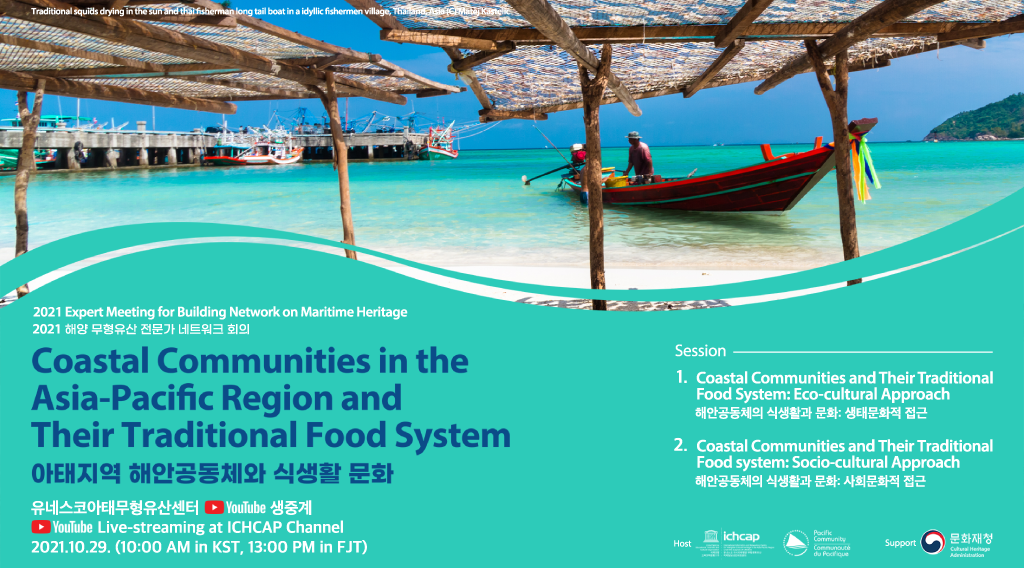Project Description
2021 Expert Meeting for Building Network on Maritime ICH
Maritime Living Heritage:
Coastal Communities in the Asia-Pacific Region and Their Traditional Food System
OUTLINE
| Date | 29 October 2021 (tentative) |
| Venue | Online |
| Theme |
Maritime Living Heritage: Coastal Communities in the Asia-Pacific Region and Their Traditional Food System
|
| Language | English |
| Co-organizers |
|
Background
The Convention for the Safeguarding of the Intangible Cultural Heritage recognizes the importance of intangible cultural heritage (hereafter ICH) as a guarantee of sustainable development, as well as a means of promoting cultural diversity. In an expansive view of ICH as a body of knowledge, belief systems, and practices which pertain to those found on land as well as those exercised in connection to different bodies of water, maritime cultural heritage is defined in this webinar series as natural resources, traditional customs, archeological sites, and established locality thoughts that form cultural practices of coastal communities and people whose cultural and economic lives are informed by a body (or bodies) of water.
In thinking of maritime ICH, it is crucial to remember the Sustainable Development Goal (hereafter SDG) 14 on the conservation and sustainable use of the oceans, seas and marine resources for sustainable development, and SDG2 on the promotion of sustainable agriculture to achieve food security. These goals constitute a global agenda that mobilizes guidelines and instruments both at the local and international levels to address food production and consumption as a living system that exists in diverse forms in different social contexts. In this light, it is necessary to have a better understanding of the food ways of indigenous peoples and traditional societies for existing policies and highly technological practices to be in place also for the needs of the ecosystem and living heritage in a time of climate change.
Communities have developed traditional food system based on a comprehensive approach to a specific life-style and environmental setting. Traditional food system, therefore, is dynamic and complex, involving knowledge, histories, socialization, and performances. All these areas of traditional food system should be carefully analyzed in search for food security and quality livelihood particularly in restrictive spaces due to COVID-19 pandemic.
HISTORY
For the past few years, ICHCAP has been working with relevant communities and scholars in the pursuit of maritime ICH safeguarding. In 2018, ICHCAP and the National Research Institute of Maritime Cultural Heritage of Korea organized a maritime seminar on Ship, Navigation and People in the Republic of Korea. Following that in 2019, ICHCAP partnered with the Hoi An Center for Cultural Heritage Management and Preservation to conduct a seminar on MaritimeTraditional Beliefs and Practices in Hoi An, Viet Nam. In 2020, when the global pandemic was wide spread, ICHCAP held the expert meeting online as an ICH Webinar Series in collaboration with UNESCO Apia Office, under the theme of Maritime Living Heritage – Building Sustainable Livelihoods and Ecosystems in the Asia-Pacific Region. Building upon the previous seminars on maritime ICH, ICHCAP and SPC are co-organizing the forth session of maritime seminar on Coastal Communities and Their Traditional Food System.
OBJECTIVES
- To improve our awareness of the relation between maritime ICH and the pillars of sustainable development, namely environmental sustainability, inclusive social development, and economic development;
- To explore maritime ICH transmission and safeguarding activities for environmental sustainability and resilience;
- To establish a network of diverse stakeholders for the safeguarding of maritime ICH in the Asia-Pacific region.

